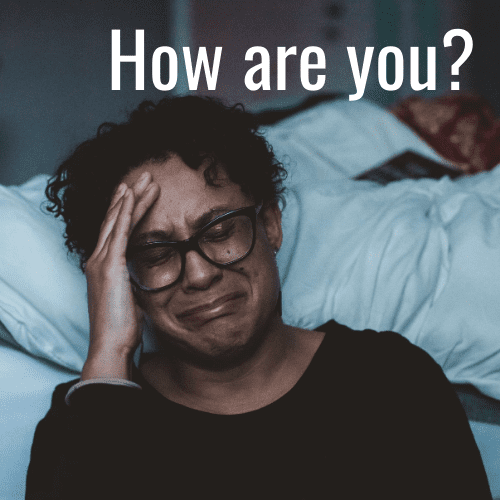Mental Health Check
Thursday September 3, 2020

Caring for a loved one with dementia is hard any day. It is especially difficult during a pandemic. So our question for you today is – How are you?
How are you coping right now?
Are you having trouble finding things to look forward to?
Are you disappointed by canceled travel plans and gatherings?
Are you feeling lost without regular church services?
Are you feeling lonely and isolated with your worries?
When was the last time you were able to hug a friend?
This is a really difficult time. And on top of all this, you are caring for someone who is especially vulnerable. It is important to recognize that all this stress and change can greatly affect your wellbeing.
The toll to your mental and physical health can range from feeling overwhelmed to health issues to depression and even suicide. It is important that we each self-examine. We need to be real with ourselves.
Signs of caregiver stress to watch out for:
- Anger at your loved one
- Anger at your situation
- Trouble sleeping
- Interrupted sleep patterns
- Anxiety
- Exhaustion
- Irritability
- Lack of concentration
If you start feeling like life is piling up on you, if you are experiencing anxiety or depression, here are some tips from counselor Grace McLaren on coping. (We found these tips in this Daily Memphian Article.)
- Create statements and affirmation on why your life is worthwhile
- Recognize warning signs of fragility such as sleep problems and outbursts of rage
- Identify triggers that send you into the red “I’m note okay” zone.
- List five supportive, nurturing people and identify places to go for care and renewal.
We would add to this list:
- Set a new goal for yourself. It can be helpful to have something to work towards.
- Be kind to your body by eating healthy, nourishing foods. We feel better when our bodies are well-fed and hydrated.
- Get moving! Exercise is so good for your mental health. Walk 15 to 30 minutes per day. Garden. Dance.
- Pay attention to your caffeine intake. Are you drinking coffee so late in the day that it makes it hard to fall asleep? Does caffeine make you feel more anxious and jittery? Consider cutting back the amount of coffee you drink and/or switching from soda to water.
- Take 30 minutes to mediate, relax, or read.
- Limit screen time. Social media time in particular! If we are constantly taking in a stream of frightening images, worries, and the opinions of others, we are going to feel more anxious.
- Keep a gratitude journal. Name 1 thing each day that you are grateful for.
- Give yourself permission to laugh. Watch a funny movie, read a funny book, watch a sitcom.
- Forgive yourself. You are not a bad person for getting frustrated. These feelings are very normal.
We know that a lot of these things are easier said than done. Maybe you don’t have 5 supportive, nurturing people you can turn to when you’re not okay. Know that we are willing to support you. If you need to talk things out, give us a call.
We all need to vent, and family or close friends are not always the answer. We are happy to be a non-judgmental, helpful resource.
We also recommend speaking to a counselor or your physician – especially if this is more than just a passing moment of anxiety or depression. Asking for help is not a sign of weakness. Asking for help is a sign of strength. It takes courage to recognize and acknowledge that you need help, and it takes vulnerability to reach out.
So we ask again, how are you?
Call us: 901-854-1200
Email us: [email protected]
We’re open Monday to Friday, 7 am to 6 pm. If you need assistance after hours, call the Alzheimer’s Association 24-Hour Helpline at 800-272-3900.




